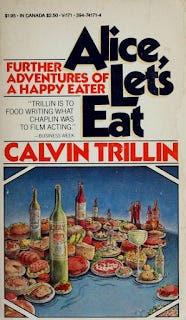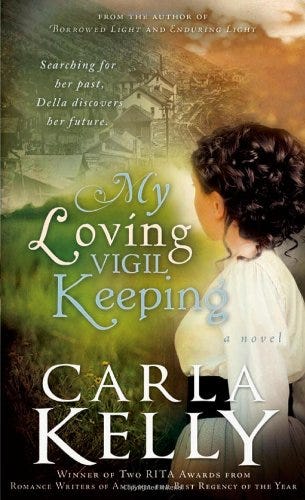Numbers 70 through 75
Is "ars criticism" a thing?
.
Diving into genre today: science fiction, historical romance, mystery, food writing, criticism, nostalgia—All the greats. Let's dive in.
.
070) Better Living Through Criticism: How to Think about Art, Pleasure, Beauty, and Truth by A. O. Scott, finished June 17
I heard about this book when it came out in 2016—on Fresh Air, maybe—and was intrigued so when it came up in a recent search for another book, I grabbed it.
I'm shocked I read the whole thing, to be honest. I read about half in one sitting, alone in an empty football stadium, waiting for a high-school graduation to begin. So that got me some momentum. I thought after that I might skim the rest, reading in full the Q&A portions only. But then last night I was on a long train ride and running out of things to read so I just kept going. And now it's finished.
It's astonishing how he manages to say the same things over and over again without ever repeating himself for 268 pages. His main rhetorical device is to contradict the last thing he said and then to argue that both both are true and neither. Honestly, it's kind of a drag. But he keeps finding new ways to say the same thing (and then to once again disagree with himself) and, somehow, sure enough: I read all 268 pages.
Who is this book for? That's a fabulous question. But I suppose we are an educated people and all of us are critics, so everybody? But really. Who finds criticism a vocation? But few of us. So I guess it's a number actually much closer to nobody.
And thus you see what he has done to me.
thirteen days
071) Alice, Let's Eat by Calvin Trillin, finished June 20
I first read this book in 2000 on the recommendation of my cousin the Spook. Lady Steed and I were living with him and his wife before we found our first apartment. It was an excellent recommendation. I've read Trillin since (mostly in The New Yorker but also here) but this is my first return to that first beloved taste.
(This is the edition I read this time, from 1979.)
Anyway, it's still utterly delightful. Good food and a good marriage. Really. What else could one possibly ask of life?
I should add this is the perfect keep-in-the-car book. Easy to dip into and out of as you wait for someone. Ideal.
some months
072) My Lovely Vigil Keeping by Carla Kelly, finished June 21
I've been hearing about Carla Kelly for some time, and this book in particular. When I finally purchased it, I accidentally sent it to my mother who read it and loved it. Then I got it back, then I kept losing it or letting library books interrupt it. It was never my "walking book" or my "bedside book" or one of those categories that get constant progress, but it was a patient book and its characters and situations are so clear and so real that it was never hard to pick up where I left off.
If you know but one thing about this book, it's probably the historical event it's inspired by. But that event doesn't occur until more than 400 pages into a 431-page novel. In other words, while I recommend reading the book, I do not recommend reading the back of the book before you begin. Live your life unknowing just as the people in the book do.
Our hero is Della, sort of a reverse orphan-who-is-secretly-a-princess. Which is to say she is the illegitimate daughter of a miner and a Greek woman (who would barely count as white at the time—if she did at all) who left her an orphan with embarrassingly curly hair. She is raised by rich relations and so the world thinks she is a child of privilege who does things like go to school and get a job our of some peculiar eccentricity, rather than desperate need.
Besides her economic needs, the cruel neglect causes her to run back to the mines, taking a job as a schoolteacher for miners' children need in the Utah mountains. This is a romance and options abound for Della, but only one man can help her excavate her buried shames in order to find her own wonderful self.
It's a lovely, fun, and funny book, and it had me teary-eyed for the entire finale. I now understand the book's lofty reputation and encourage you too to seek it out.
about a year, probably more
073) Dreamsnake by Vonda N. McIntyre, finished July 9
I picked this up on Ursula's recommendation and because I was intrigued by a character whose gender is never identified by the text. The lack of gendered pronouns is smoothly done and if she hadn't pointed it out, I doubt I would have noticed.
The novel is episodic in nature and occasionally drops in plot points only to abandon them and leave you feeling a bit wondering why they even showed up (the cat in the cave, for instance), but the story overall is enjoyable and exciting and Snake is an excellent protagonist. (In short, I agree with OSC.) The sex wasn't as wild and frequent as Ursula led me to expect. I've never quite adopted the opinion that it's theoretically possible to develop a culture with utterly casual attitudes toward sex (and although I can't find them now, I've read several articles recently about the attitude toward sex in Gen Z tending to agree), but it's still a valuable possibility for fiction to consider.
Anyway, it won the Nebula AND the Hugo AND the Locus and while that kind of surprises me and seems like a relic of his era, the book HAS aged well all the same and I enjoyed reading it. It's out of print though and largely gone from libraries almost fifty years on from its hardback release, so good luck finding one. Crazy no one's leapt on its publication rights.
more than two weeks
074) The Red House Mystery by A. A. Milne, finished July 11
I picked this up on Raymond Chandler's "recommendation" and am quite glad I did. The sleuth and his pal are cheery company (not for nothing does this edition quote Wodehouse saying, "I love his writing") and, while I too notched a couple of Chandler's complaints, my only real problem with the story (treating it as airy entertainment rather than literahtoor) was the penultimate chapter in which the culprit writes a lengthy confession. (Which reminds me: Chandler gives the whole thing away. Luckily, enough time passed before I read the novel myself that I had forgotten everything.)
The novel is such that the leaps made by the sleuth delight while the larger pieces of the puzzle fall into place without requiring his explaining them to us. It's that kind of mystery.
about three days
075) Best. Movie. Year. Ever. How 1999 Blew Up the Big Screen by Brian Raftery, finished July 16
Another book I grabbed from the library intending to skim, reading about the movies that most interested me (you can see what he covers here), then returning mostly unread, but I started it postlibrary, sitting in the park while my daughter swung, and then I just kept going.
I should start by rolling my eyes at the let's-sell-books-with-controversy title. While I think Raferty believes the claim, he hardly proves it. Almost every reason he gives he contradicts elsewhere in the book or simply fails to hold up under consideration. The most persuasive version of his best-ever claim is in an interview he did with producer Brad Simpson: "I thought it was the beginning, but it was actually the peak." Granted, without all the other quotations and movie titles surrounding it, less persuasive. But yeah. Maybe it was. Who knows. As writer Richard Curtis said, " Madrigals were huge in the fifteenth century."
Both those quotations get to what's really great about this book though and that is the numerous and voluminous interviews Raftery did with people involved with every element of filmmaking. It's fabulous. As a series of oral histories of movies that were made in 1999, this book is truly excellent. But I guess Some Cool Movies from 1999 wasn't going to move as much copy.
Anyway, it's a terrific book. If it didn't waste the occasional work trying to justify it's title, I might not have any complaints at all. If you're into this stuff, consider Best. Movie. Year. Ever. highly recommended. Even with that title
almost exactly a week to the hour




